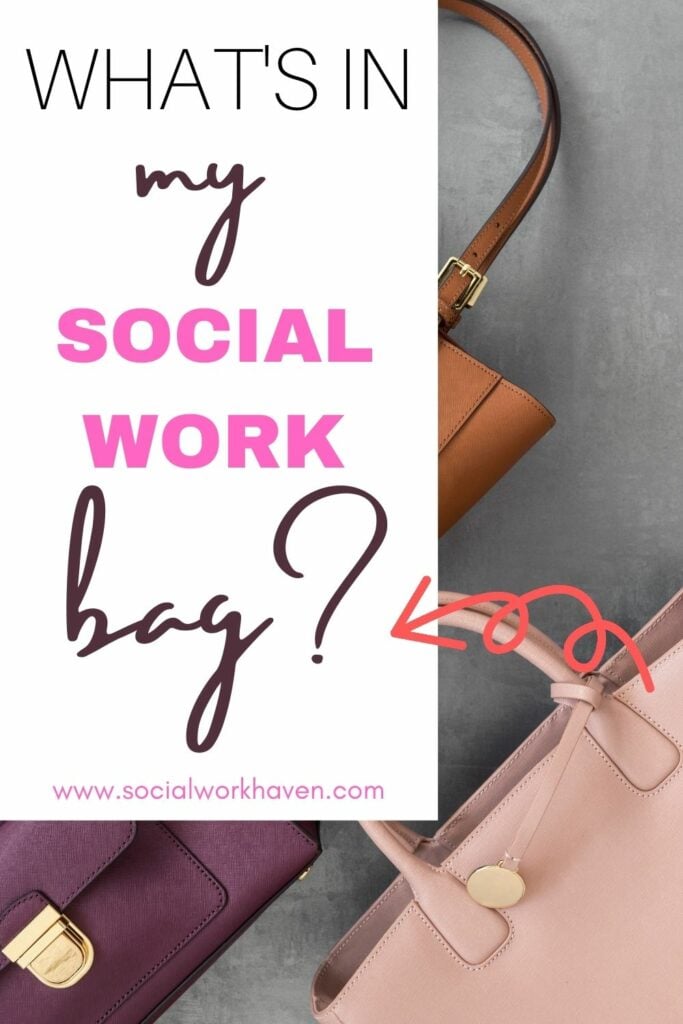Because of the recent pandemic, a lot of professionals are working from home, but as social workers, we still travel a bit to see individuals in their homes.
Having a social worker survival kit is essential to help you deal with any situation.
A social worker survival kit is a pack of emergency items that may include food, tools, stationary, and a collection of items to help a social worker in all kinds of situations.
When I could go into the office every day, I didn’t pay much attention to what was in my bag as at all times; I had access to stationary, snacks and most necessities I needed to perform my role.
What’s in your social worker’s survival kit?
So, I was thinking, what should a social worker with no office have in their bag?
Perhaps a social worker’s survival kit?
After speaking to a few social workers about what they keep in their purse, bag or car for work that they find helpful, I came up with the list below.
Items to have in your social work bag as a social worker
#1 Bag essentials
- Hair ties for ladies if needed for days, you need to keep your hair tied.
- A comb or brush to tidy up your hair so you look professional when visiting the client’s house. As a public facing career and it is crucial you represent the industry, establish relationships and act in a responsible and ethical way.
- Paying attention to your appearance will give a positive impression to the individuals you support.
- Hand sanitizer–Keep and use a hand sanitizer to help kill harmful germs and reduce microbial counts.
- Lotion to moisturise dry skin, elbows and heels to make you feel comfortable and keep your skin healthy.
- Extra pens–not having a pen when you turn up at a client’s house makes you appear unprepared for the visit.
- GPS or Map–Having access to GPS on your phone or a map will be a lifesaver when you are left stranded. Download Google maps and it will sort you out.
- You never know when your App might cease to work or your phone battery might die, so have a backup physical map of the area.
- Pencil–for when you have to write on a document you may want to erase later.
- Notebook–taking good notes during an assessment will help you write a report that reflects what you have discussed.
- Actively taking notes during an assessment will help you focus and better understand what the client is saying. Good note taking will help improve your active listening skills and comprehension.
- Remember to maintain eye contact while you are taking notes.
- Client paperwork you need, but not in excess.
- A snack or lunch for those busy days. It is important not to eat or munch in a client’s house, no matter how hungry you are.
- Healthy, non-perishable snacks–remember to keep healthy snacks (e.g. protein bar). These are perfect to keep you going when you don’t have time to stop and eat.
- A small knife or scissors to cut up packages, folders or sealed envelopes.
- A small makeup bag for those hard days when you feel worn out. Make-up can also help build up your self-esteem and confidence.
- Pack of tissues for drying or cleaning where quick absorption is required.
- A lightly scented hand cream for freshening up and keeping your hands moisturised.
- A small notebook with multi coloured pens, gel pens and highlights.
- An extra pair of clean clothing or a shirt.
- Water–Carry a bottle of water in your bag at all times to keep yourself hydrated.
- You never know when you will be stuck somewhere for a long period. Sometimes you may visit a client’s home and find them in a terrible state of health requiring hospital admission. Waiting for an ambulance to convey them may take a while and lead to a late night.
- You may even have your clothes soiled unexpectedly. The clothes in your bag don’t have to be fancy. They may be a t-shirt or sweatshirt depending on the season.
- Some sweater/shawl for when the weather is not so great and you have not dressed to suit the weather.
- Gum or Tic Tacs to keep you awake and alert all day
- Laptop for case notes recording or to check on client information if needed
- A fully charged mobile phone
- Contact details of your colleagues and relevant agencies stored on your phone.
- Ibuprofen, antihistamine, paracetamol – Whether it’s staving off that impending headache or giving it to someone who’s sprained an ankle, these drugs are a must-have for every emergency bag.
- Remember, people may be allergic to certain medication, so check with them before offering your emergency tablets.
- Don’t forget your glasses and keep a spare one if you have one.
- Flashlight and extra batteries
- You can use your phone as a flashlight; however, you’ll drain your battery quickly. Get yourself a small, lightweight flashlight.
#2 Purse essentials
- Some change at least £5 or $5 should you have to pay for parking
- Cash and bank card for emergency purchases
- Business cards for any local services relevant to the work
- Complimentary cards
- A small note pad
- Emergency contact numbers
#3 Car essentials
- Books to read for when you have to wait for a client or have time between visits.
- Hand sanitizer
- Comfortable shoes you can wear if your work shoes are killing your feet
- Case files to refer to
- Power bank to charge your work or personal phone in case of an emergency
- Rain boots in your car boot.
- Umbrella for either protection from severe weather elements such as rain or from the sun.
- Raincoat–This will be your saviour during stormy weathers. The weather can be unpredictable, so be prepared with a waterproof jacket or coat.
- Plastic bag and extra clothes
- Your car insurance details
- Breakdown cover details for
- Gallon of water which can be used as a coolant for your car.
- A pair of socks–socks are important because they will protect your feet from rubbing against your shoes when you do a lot of walking. Keep thick socks when the weather is cold and ankle socks if you will wear trainers.
You may also choose to have a social worker survival kit in your car boot with all the items listed above.
Before you go
Thank you so much for reading this article, I hope you have learned a thing or two regarding what you need to have in your bag as a social worker.
I would love to hear what you keep in your bag that has been very useful in your role as a social worker without an office.
DON’T FORGET TO PIN IT FOR LATER!






